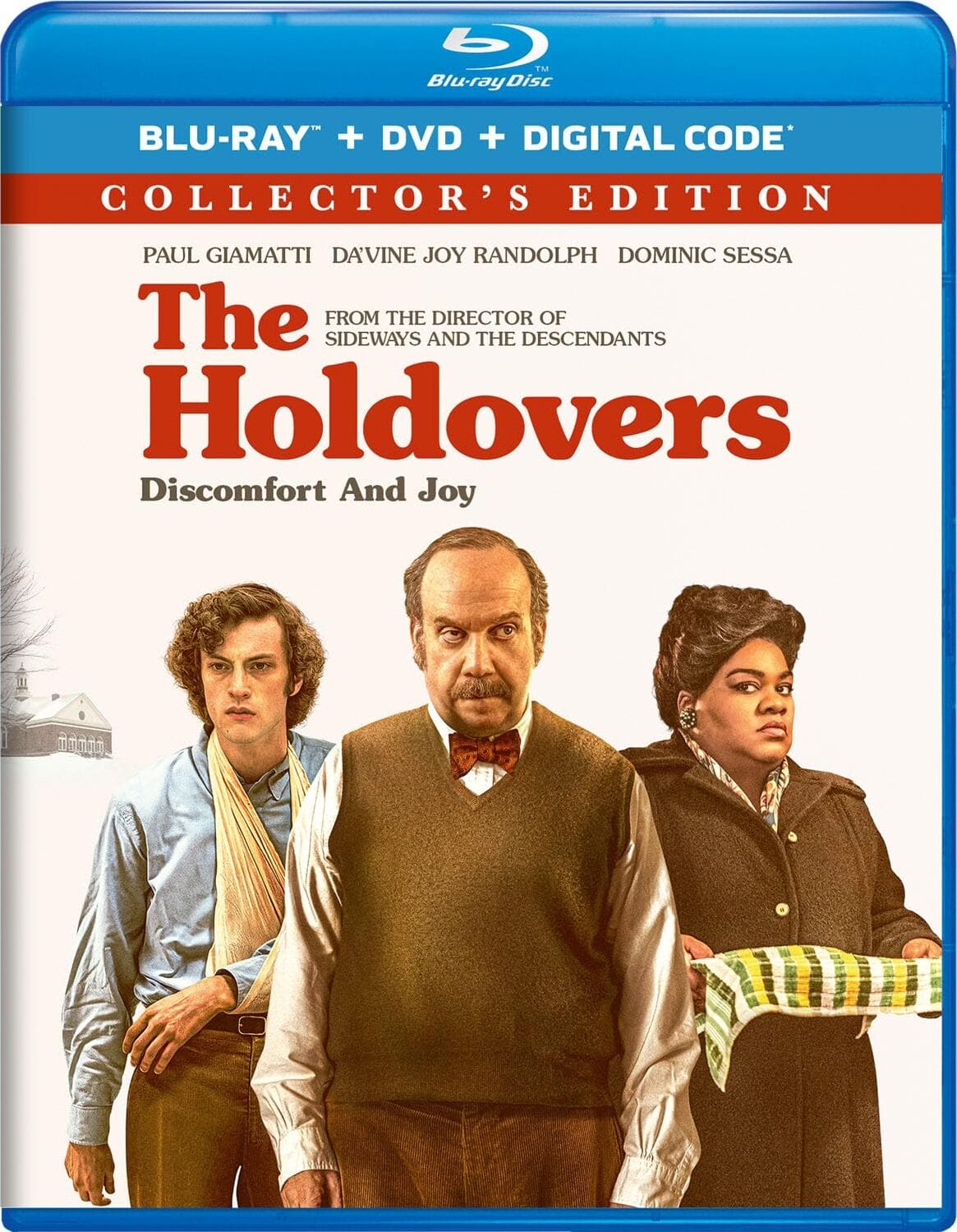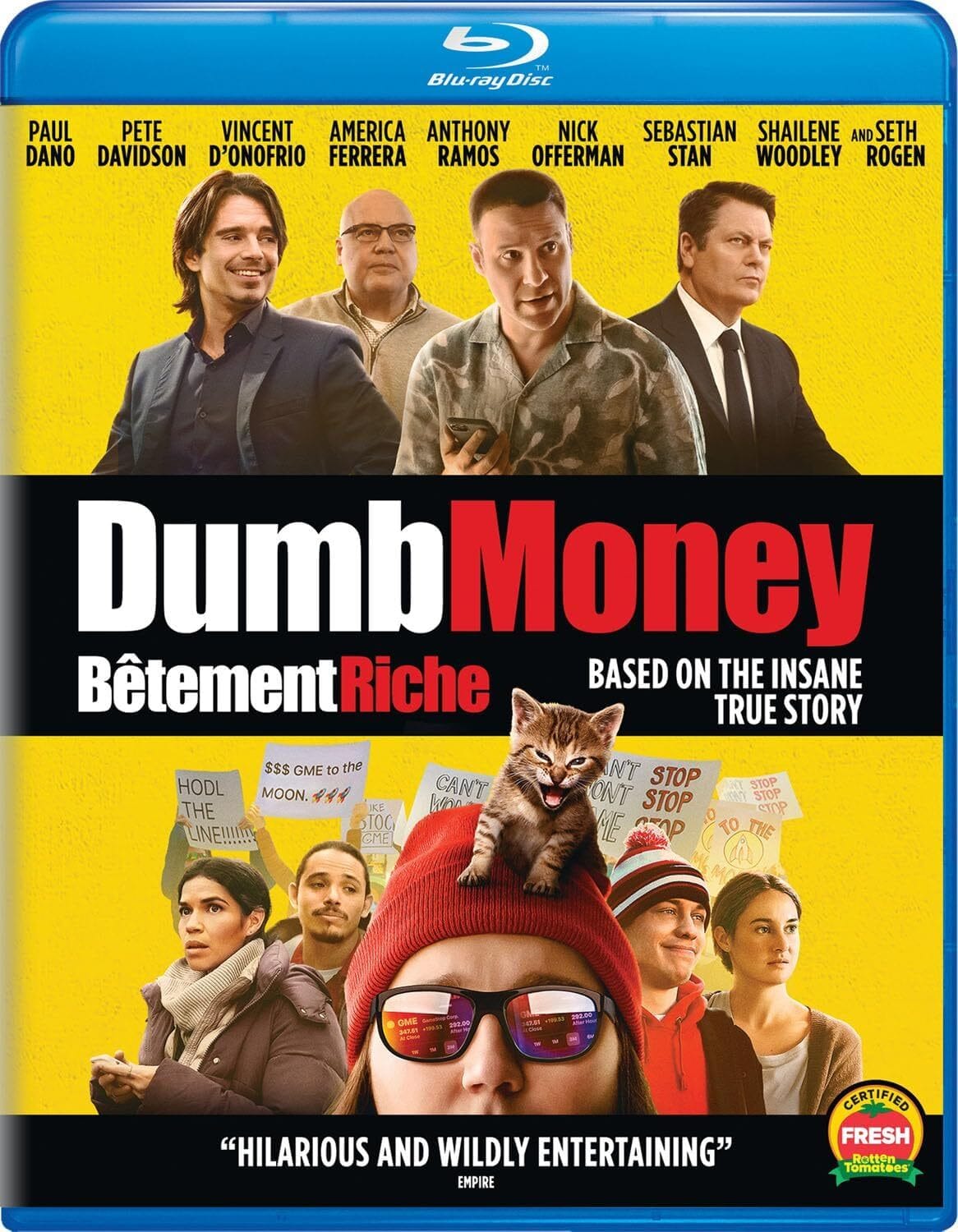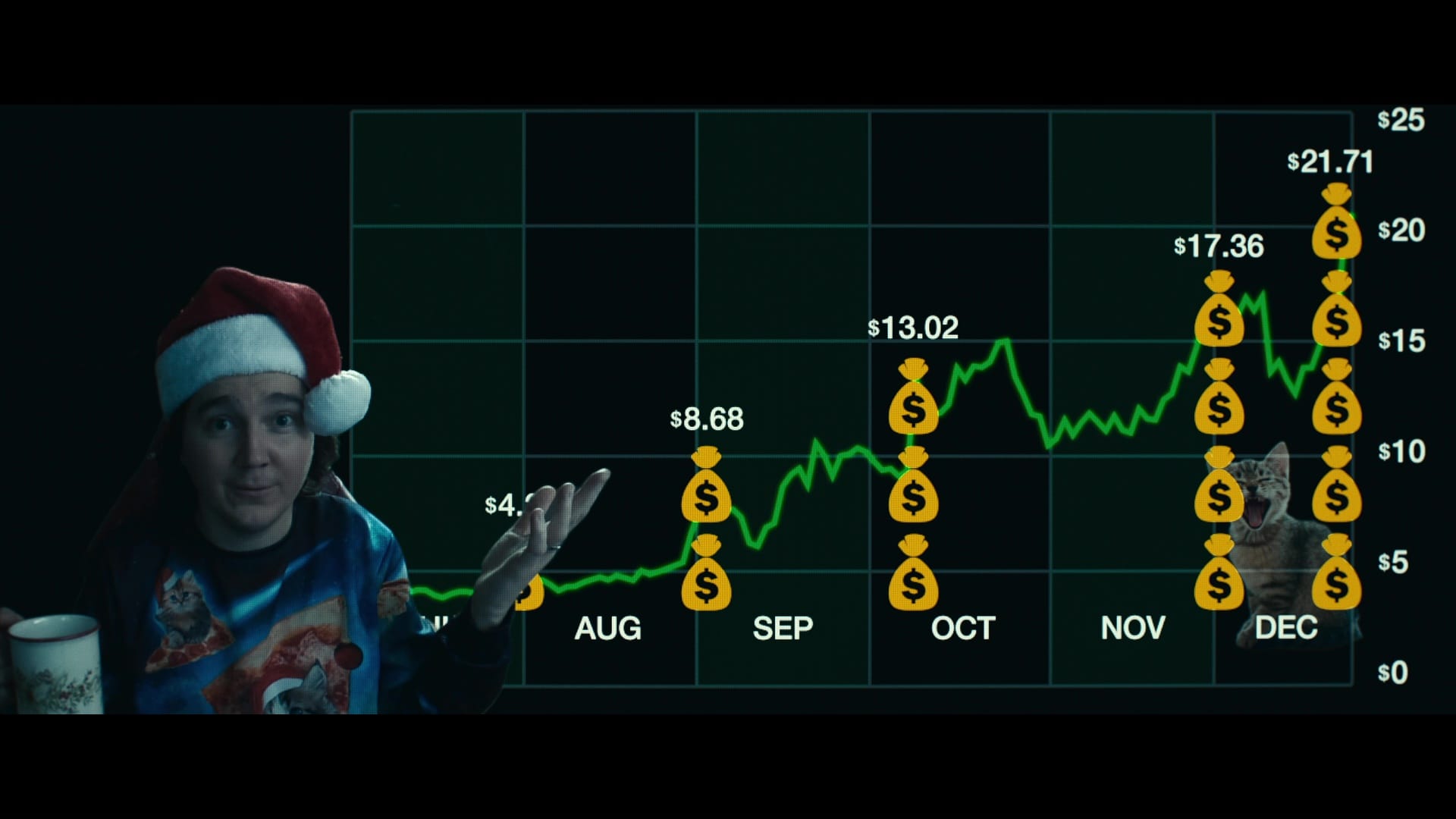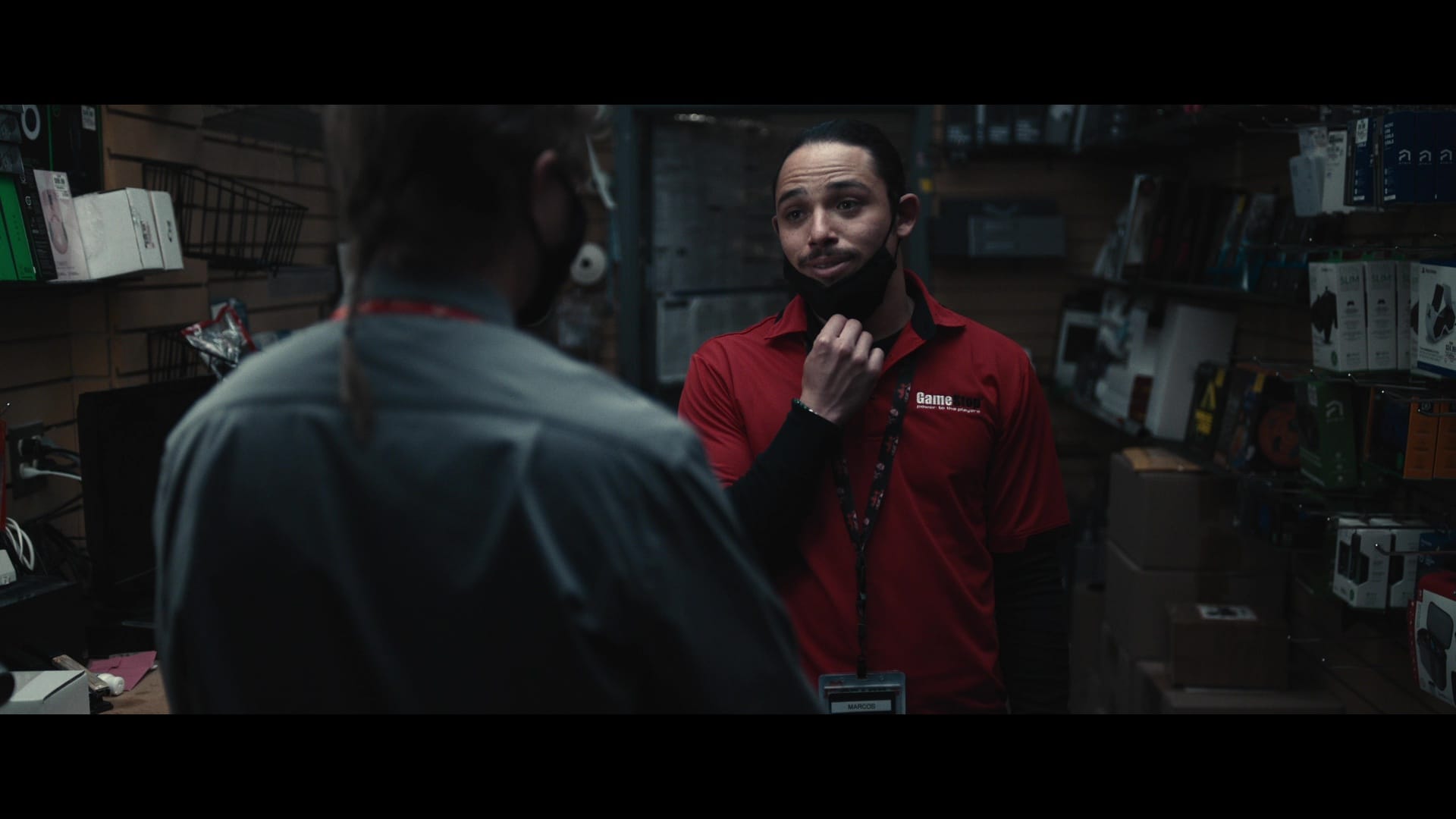Money and Status
In which Norm spins up THE HOLDOVERS and DUMB MONEY, which take us back to two very specific moments in American history.

I’m writing this two days after the Oscar nominations were announced, and I have two things to say about them.
First, it’s great to see Nisha Pahuja’s To Kill a Tiger in the running for Best Documentary Feature, and if you haven’t seen this devastating, urgent work you can catch it at the Lightbox on February 13th, when I’m hosting a free See the North screening.
Second, I’m really glad I don’t have to write about the Oscar nominations anymore. There are only so many ways to say “Look, I’m sorry a movie you didn’t like got more nominations than a movie you did.” I’m happy when artists I like win things, and less happy when they don’t but also, eh, whatever.
Look at the two movies I’m writing about today! The Holdovers and Dumb Money are both solid dramatic works from genuine artists; both films premiered at TIFF 2023 and were released by major studios. One of them is now in the running for five Academy Awards, while the other was snubbed entirely. It doesn’t change either movie in the slightest.

Let’s start with The Holdovers, since it just arrived on disc this week (in Canada, anyway; in the US, the Blu-ray and DVD editions dropped a few weeks ago, thanks to Universal’s weird staggered release schedule). Alexander Payne’s latest film – his first since the debacle of Downsizing in 2017 – is a modest character piece starring Paul Giamatti as Paul Hunham, a cranky classics teacher at a New England boarding school whose lack of a personal life leads him to spend the Christmas break minding the handful of students who aren’t going home for the holidays.
Circumstances conspire to saddle him with just one kid, the troubled Angus (Dominic Sessa), and over a few chaotic days teacher and student learn a little about life from one another, with occasional input from the school’s cafeteria administrator Mary (Da’Vine Joy Randolph), who’s dealing with her first Christmas after her losing her son in Vietnam.

After biting off far more than he could chew in Downsizing, Payne is very consciously retreating to familiar territory here, telling a simple, confined story while offering Giamatti a showcase for his specific vibe in the fussy, hidebound Hunham, who believes himself a bastion of enlightenment in a world too coarse to appreciate the gifts he offers it. You’d swear Giamatti has played this character before – and of course he has, in Payne’s 2004 Sideways – but this is an older, more broken take, and one that Giamatti inhabits fully.
Indeed, the actor is so good at finding the martyr complex that drives Hunham’s put-upon prickliness that it seems almost churlish that the movie should burden him with weird physical issues like having a lazy eye and a faint but persistent aroma of fish; Giamatti projects such an aura of simmering hostility that people don’t need any other reason to keep their distance.

But Paul Hunham’s not such a bad guy, of course, and over the course of The Holdovers he grows to see the value of the people around him and accept the fact that academia isn’t the meritocracy he needed it to be. He learns to be less of a chump, I guess, and for an Alexander Payne movie – especially one that styles itself so closely after Hal Ashby’s cynical classics Harold & Maude and The Last Detail – that counts as a triumph.
The thing that fascinated me about watching The Holdovers was the creeping sense that Payne expects us to receive his film as a classic work, rather than wait for critical and popular consensus to form over months or years or decades. The Holdovers is a very good movie, and Giamatti might win an Oscar for his performance here, but its ersatz Ashby vibe – right down to the digitally generated scratches and vintage logos that open the picture – felt more than a little calculated to me, as did the fairly simplistic class dynamics that define the characters.

Is Payne saying that a 1970 audience was more tolerant of the contrivances on which David Hemingson’s script builds its key conflicts? Or that nothing’s really changed for anyone, and comfortable white men can hide from the world in their Ivy League offices while working-class kids do their fighting for them? Maybe it’s both. Or neither. Maybe it’s just a story about some people figuring some stuff out, in a specific place and time.

Craig Gillespie’s Dumb Money is just as invested in re-creating a specific place and time: The winter of 2020-21, when COVID was still raging and people – okay, Americans – had nothing to do but sit at home and fume impotently about all sorts of things. One of them was the stock market, and how impossible it was to make money unless you had some sort of edge – and, if you believe the movie, that’s where the GameStop thing started.

Dumb Money is the story of Keith Gill, a Massachusetts financial analyst and YouTube live-streamer under the handle Raging Kitty who invested his life savings in shares of the failing videogame chain, insisting the brand still had value. His streams caught fire on Reddit, and in a matter of months, he’d sparked a movement of civilian investors – “dumb money”, in Wall Street parlance – that sent the stock’s value soaring, leaving the various hedge funds who’d been shorting GameStop in expectation of its collapse exposed to massive losses.

The film structures the ensuing chaos as an ensemble drama, the story of a dozen or so characters whose lives are directly affected by Gill’s jargon-happy monologues – and Gill himself, of course.
Paul Dano plays Gill as a sweet-natured husband and father who just happens to be really good at talking into a webcam; his scenes at his desk play like the inverse of his tightly-wound mania as The Batman’s seething Riddler. Shailene Woodley is charming and relaxed as Gill’s wife Caroline, who’s portrayed as an equal partner rather than a blankly supportive wife, and Pete Davidson does his Pete Davidson thing as Keith’s dirtbag brother Kevin, who yells a lot about how his brother is a nerd but has to respect the whole basement-millionaire thing.



Representing the dumb money are a long-term care nurse (America Ferrera), a couple of college students (Talia Ryder and Myha’la Herrold) and an actual GameStop employee (Anthony Ramos) who all buy in early at Gill’s urgings and share the white-knuckle experience of trying to decide when to cash out.

Representing the high-rolling face of evil – sorry, the benevolent gods of money management – are Nick Offerman, Vincent D’Onofrio, Seth Rogen, Sebastian Stan and Rushi Koa, all of whom have a vested interest in seeing Gill’s movement fail.
Lauren Schuker Blum and Rebecca Angelo’s screenplay is a marvel of exposition, passing along information in conversations and arguments rather than stopping the story dead for didactic explanations, and Gillespie’s skill with establishing character and tone quickly and efficiently – a facility he developed directing commercials, where you have to build worlds and tell entire stories in a matter of seconds – lets him move the story at a brisk clip, tracking the phenomenon in news pieces, YouTube clips and memes so we can be astonished by it right alongside the people making it happen.

He also finds room to let Dumb Money be one of the first movies to tackle the idea that the stress of the pandemic splintered the social and cultural fabric – perhaps irreparably – in ways we still can’t fully comprehend. At a point in time when movies and television are still barely acknowledging the disruption of the last four years, seeing Dumb Money not just deal with the pandemic but take a moment to mourn its victims was shocking. Roaring Kitty was in the right place at the right time to galvanize a community of alienated, isolated, terrified people who needed somewhere to put their feelings.
Was embracing the GameStop brand a retreat into the comforting nostalgia of childhood, or another sign of the exponential tribalization of online life, where it’s us-versus-them all the time and every action has to be a zero-sum proposition? Barely four months after the film opened, there’s so much more talk of legacy brands and asset stripping, another reason I’m surprised Dumb Money failed to pull a single Oscar nomination. Maybe they should have held the release until December.

Elevation’s Dumb Money Blu-ray is a mirror of the Sony disc available in the US, with an excellent 1080p/24 transfer that is indeed presented in its correct 2.39:1 aspect ratio despite the packaging mislabeling it as 2.00:1 – and a busy but always coherent DTS-HD audio. Neither label is offering a 4K edition, which is a shame; Gillespie never gets enough credit for his visuals, and all the variations of tone, texture and temperature in Nicolas Karakatsanis’ cinematography would look even better in UHD.

The highlight of the supplemental section is a breezy and informative audio commentary from Schuker Blum and Angelo – who discuss, among other things, the terrifying speed with which their first draft had to be written, as there were nearly a dozen projects in development about the GameStop story. Generic looks at the production and the ensemble cast and a trio of deleted and extended scenes round out the package.
Universal’s Holdovers release follows a similar pattern, with a solid presentation of the feature (in all its carefully manicured artifice, right down to the tobacco-tinted palette and 3.0 DTS soundtrack – left, right and center, just as it never would have sounded in 1970) and a smattering of deleted scenes, an alternate ending, and featurettes offering looks at the shoot and the cast and crew’s admiration for Payne’s collaborative nature … which, sure? No 4K edition on this one either, though I’m wondering whether Criterion might roll one out at some point. It’d look great on the shelf next to Harold and Maude.

The Holdovers is available now in a Blu-ray/DVD combo edition from Universal Studios Home Entertainment. Dumb Money is available on Blu-ray from Elevation Pictures in Canada and Sony Pictures Home Entertainment in the US. And if you’re still reading this, and you live in Canada, Elevation has given me a copy of the Dumb Money BD to give away! Just e-mail me at normwilner@gmail.com with the subject line “GameStop Forever” by noon on Sunday, January 28th, and I’ll choose a winner at random. See? Reading the fine print is fun!
In this weekend’s paid edition: Jennifer Eight, baby! Upgrade that subscription so you don’t miss any of my rambling recollections of the press junket.
